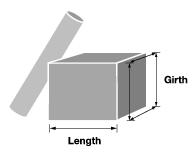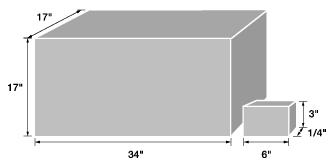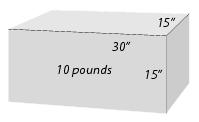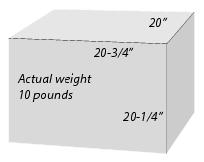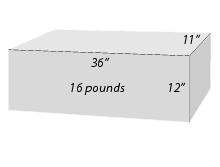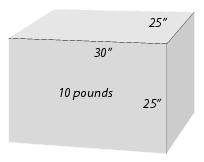|
|
|
Quick Service Guide 401Commercial ParcelsPhysical Standards for Commercial ParcelsMay 12, 2008 Overview
Measuring Length Plus Girth (401.1.0) For parcels, length is the measurement of the longest dimension and girth is the distance around the thickest part (perpendicular to the length).
Except for Parcel Post and Parcel Select, no mailpiece may measure more than 108 inches in length and girth combined. Parcel Post and Parcel Select pieces measuring over 108 inches but not more than
The Postal Service classifies parcels as machinable parcels, irregular parcels, or outside parcels. Machinable Parcels (401.1.5) If you prepare your discount parcels so that they can be processed on Postal Service equipment, your mail is "machinable." Machinable parcels must meet specific standards for size, shape, content, and weight. Minimum weight: 6 ounces (3.5 ounces for parcels prepared under 401.1.5.2). Maximum weight: 35 pounds (25 pounds for books and other printed matter). Lower weight limits apply to First-Class Mail, Standard Mail, and Bound Printed Matter. Dimensions: Soft goods wrapped in paper or plastic bags and enveloped printed matter are machinable only if all packaging standards in 601.2.0 are met.
Irregular Parcels (401.1.6) Irregular parcels include parcels that do not meet the dimensional criteria of machinable parcels and other parcels that cannot be processed by parcel sorters, including:
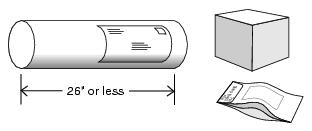
Outside Parcels (401.1.7) Outside parcels exceed any of the maximum dimensions for machinable parcels. This category also includes certain high-density items, cartons containing more than 24 ounces of liquids in one or more glass containers, cartons containing 1 gallon or more of liquid in metal or plastic containers, and items in 401.1.7.

First-Class Mail Parcels (401.2.1) Maximum weight: 13 ounces. Unless prepared in 5-digit/scheme containers or paid at a single-piece price, presorted parcels are subject to a $0.05 surcharge if any of the following apply: See Quick Service Guide 430, First-Class Mail Presorted Parcels. Bound Printed Matter (401.2.4) Maximum weight: 15 pounds. Barcode discount: $0.03 discount available for machinable parcels (50-piece minimum), except parcels mailed at presorted DDU, DSCF, DBMC parcels entered at an ASF other than the Phoenix, AZ ASF, and carrier route prices. For additional information, see Quick Service Guide 460, Bound Printed Matter Nonmachinable and Machinable Parcels. Media Mail Maximum weight: 70 pounds. Barcode discount: $0.03 discount available for machinable parcels (50-piece minimum), mailed at Basic prices. For machinable parcels, see Quick Service Guide 470. For preparation of irregular parcels, see 475.5.3. Library Mail Maximum weight: 70 pounds. Barcode discount: $0.03 discount available for machinable parcels (50-piece minimum), mailed at Basic prices. For prices, eligibility, postage payment, and mail preparation, see Quick Service Guide 480. Standard Mail Parcels (401.2.2) Maximum weight: less than 16 ounces. Unless prepared in carrier route (irregular parcels only) or 5-digit/scheme containers, Standard Mail parcels are subject to a $0.05 surcharge if machinable parcels do not bear a UCC/EAN Code 128 barcode or irregular parcels do not bear a UCC/EAN 128 barcode or POSTNET barcode. See Quick Service Guides: Standard Mail Not Flat-Machinable Pieces (401.2.2) Standard Mail with the following characteristics are Not Flat-Machinable pieces unless mailed as parcels: A. Rigid pieces or pieces not uniformly thick with the following dimensions: B. Flexible pieces that are at least 4 inches high, but not more than 12 inches high, with either of the following dimensions: C. Nonmachinable letter-size pieces weighing more than 3.3 ounces must pay the Not Flat-Machinable price, unless they qualify to be mailed at automation flat-size prices. Unless prepared in 5-digit/scheme containers, Not Flat-Machinable pieces are subject to a $0.05 surcharge if:
For Not Flat-Machinable pieces, see Quick Service Guide 440d. Parcel Select (401.2.3) Oversized Price: pieces measuring more than 108 inches in combined length and girth, but not more than 130 inches in combined length and girth, are mailable at the applicable Parcel Select oversized price. Oversized prices are not subject to the nonmachinable surcharge. Balloon Price: Parcel Select pieces measuring more than 84 inches in combined length and girth, but not more than 108 inches in combined length and girth, and weighing less than 20 pounds are mailable at the price equal to that of a 20-pound parcel for the zone to which the parcel is addressed. Parcel Select machinable parcel prices are lower than Parcel Select nonmachinable parcel prices. Nonmachinable Parcel Select: Pieces that meet any of the following criteria must pay the nonmachinable surcharge. The surcharge does not apply to pieces mailed at oversized prices or parcels sent with special handling. a. A parcel more than 34 inches long, 17 inches wide, or 17 inches high. b. A parcel less than 6 inches long, 1/4 inch thick, or 3 inches high. c. A parcel that weighs less than 6 ounces (except under 401.1.5.2) or more than 35 pounds. d. A parcel containing more than 24 ounces of liquid in glass containers, or 1 gallon or more of liquid in metal or plastic containers. e. An insecurely wrapped or metal-banded parcel. f. A can, roll, or tube, or wooden or metal box. g. Books, printed matter, or business forms weighing more than 25 pounds. h. A high-density parcel weighing more than 15 pounds and exerting more than 60 pounds per-square-foot pressure on its smallest side. i. A film case weighing more than 5 pounds or with strap-type closures, except any film case the USPS authorizes to be entered as a machinable parcel under 401.1.5 and to be identified by the words "Machinable in United States Postal Service Equipment" permanently attached as a nontransferable decal in the lower right corner of the case. j. Parcels with characteristics (such as inadequate packaging) that could result in damage to the contents of the mailpiece, other parcels, or postal machinery if mechanical sortation is used.
|
|||||||||||||
